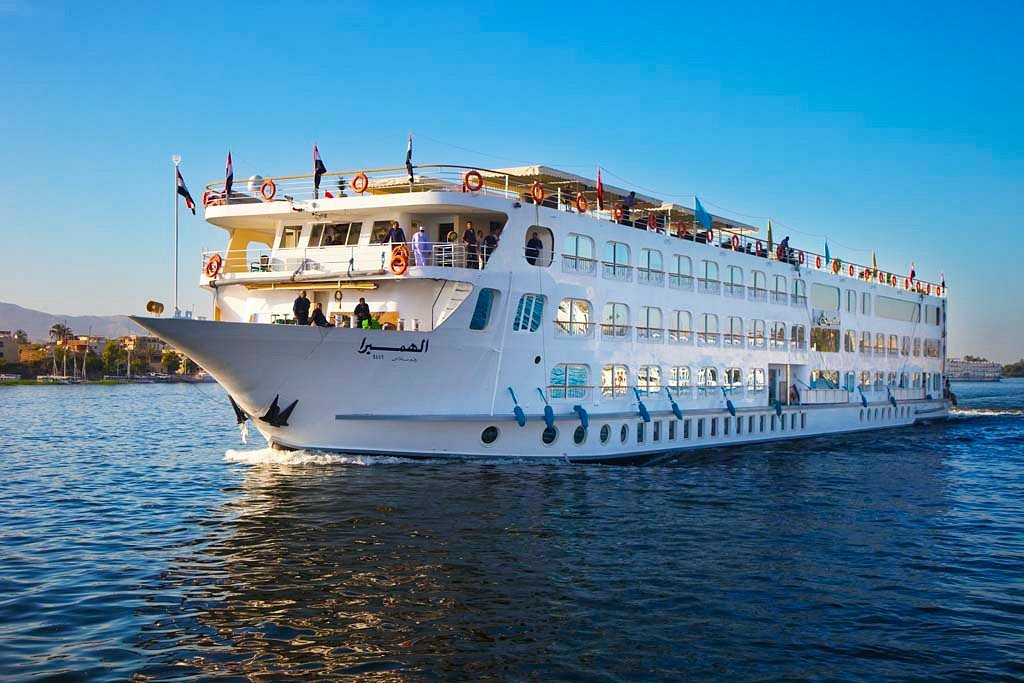Weather in Luxor and Aswan, Egypt: A Comprehensive Guide
Weather Aswan and Luxor Egypt: Choosing the right time to travel is crucial for a fantastic vacation, and one of the most significant factors to consider is the weather. The climate in Upper Egypt, specifically Luxor and Aswan, is semi-arid, characterized by hot temperatures and low humidity. This means that temperatures remain high throughout the year, with minimal chances of rainfall, making it a popular destination for tourists seeking a warm and dry climate.

Luxor Weather:
Situated in the heart of the desert, Luxor boasts a predominantly hot climate year-round. It's important to note that Luxor experiences some of the highest temperatures in Egypt. Due to the arid weather, average temperatures can soar above 40 degrees Celsius (104 degrees Fahrenheit) during the summer months. However, the winter season is relatively short and is undoubtedly the best time to visit Luxor, especially in January.
Average Weather Conditions in Luxor:
Here are some interesting facts about the average weather conditions in Luxor, compiled from historical climate data:
- Best Months to Visit Luxor: If you're looking for the most comfortable weather in Luxor, it's recommended to visit in December, January, or February when you'll experience the most pleasant average temperatures ranging from 20 to 25 degrees Celsius (68 to 77 degrees Fahrenheit).
- Hottest Months in Luxor: The hottest period in Luxor runs from April to mid-November. This time of the year is known for extreme dryness, with daytime temperatures being scorching hot.
- June's Extreme Heat: June stands out as the hottest month in Luxor, with daytime highs reaching a scorching 41 degrees Celsius (105.8 degrees Fahrenheit).
- January's Coolness: On the other hand, January is the coldest month in Luxor, with daytime highs averaging 23 degrees Celsius (73.4 degrees Fahrenheit).
- October's High Humidity: October is the most humid month in Luxor, and tourists are advised to avoid it.
- Driest Month: August is the driest month in Luxor, characterized by extremely low humidity.
Rainfall in Luxor:
Rainfall in Luxor can be categorized into three main phases:
- Low Chance of Rainfall: Significant chances of rainfall are slim during February, April, and June.
- Low Rainfall or Snowfall Possibility: Early January rarely sees rain or snowfall.
- Higher Rainfall Opportunity: Early March presents a more significant opportunity to enjoy rainfall or even snowfall.
As for snow, weather stations report no annual snowfall in Luxor.
Humidity and Wind in Luxor:
While there are no specific months representing a high-humidity period in Luxor, December stands out as the most humid month, with a humidity rate of 44.2%. Generally, winds in Luxor are quite calm, with June, July, and May being the driest months. Wind speeds average 3.9 knots in June.
Weather Aswan :
Aswan, another breathtaking city in Egypt, is renowned for its rich historical heritage and stunning natural beauty. Located on the eastern bank of the Nile River in southern Egypt, Aswan enjoys beautiful weather for most of the year. Approximately half of the year experiences hot and dry conditions, while the rest offers a pleasant climate with minimal chances of rainfall.
Temperature in Aswan:
About half of the year in Aswan is hot and humid, with August, July, and June being the hottest months. It's wise to avoid visiting during these months as daytime temperatures can be scorching. However, hotels and Nile cruises offer attractive prices during this season due to reduced tourism, providing an opportunity to secure competitive rates if you can handle the heat.
Rainfall (or Snowfall) in Aswan:
If you plan to visit Aswan during the dry season, consider scheduling your trip in February, June, or July when there is minimal rainfall. Rainfall in early January is a rare occurrence, but you might witness rain in early March. Similar to Luxor, Aswan doesn't report annual snowfall.
Humidity and Wind in Aswan:
There are no specific months in Aswan that represent a humid climate, though December is the most humid month, with a humidity rate of 28.1%. Wind speeds are typically moderate in Aswan, with June being the windiest month, averaging 7.6 knots.
Best and Least Crowded Months to Visit Aswan:
January is the busiest month in Aswan, followed by November and December. Hotel prices, Nile cruises, tours, and domestic flights in Aswan are the most expensive during these months. To secure the best rates, make your reservations well in advance.
Tourist Attractions in Luxor and Aswan:
- Pharaonic Temples: Luxor and Aswan boast several famous Pharaonic temples. Visit the Karnak Temple in Luxor, known for its massive columns and stunning inscriptions. In Aswan, explore the Great Temple of Philae, an architectural marvel.
- Valley of the Kings: Luxor's Valley of the Kings is a significant archaeological site, housing many Pharaonic tombs, including King Tutankhamun's tomb.
- Nubian Village: Don't miss the opportunity to visit a Nubian village in Aswan to learn about the culture and traditions of the indigenous people.
Traditional Egyptian Cuisine:
- Kebda and Sogo': Try kebda (liver) and sogo' (sausage), popular street food dishes in Egypt.
- Fava Beans and Ta'ameya: Enjoy fava beans and ta'ameya (Egyptian falafel), a famous breakfast dish.
- Koshari: Savor koshari, a hearty dish with rice, lentils, pasta, chickpeas, and tomato sauce.
- Kebabs: Taste kebabs, often served with rice and vegetables in Egyptian restaurants.
Activities and Sports:
- Nile Cruises: Book a Nile cruise on a felucca and admire the picturesque views along the Nile River.
- Scuba Diving: Explore excellent diving spots in the nearby Red Sea, teeming with marine life and coral reefs.
- Camel Riding: Experience camel riding in the desert for a unique adventure.
Shopping:
Explore the markets of Luxor and Aswan, where you can purchase handmade local gifts and souvenirs, including textiles, traditional clothing, and handicrafts.
This comprehensive guide to Luxor and Aswan provides all the essential information you need to plan your trip to these remarkable Egyptian destinations, including details on the weather, tourist attractions, cuisine, activities, and more. Whether you're an adventure seeker, history buff, or food enthusiast, Luxor and Aswan have something special to offer every traveler.
Aswan and Luxor Egypt:
Q1: What is the best time to visit Luxor and Aswan for pleasant weather? A1: The most comfortable weather in Luxor and Aswan can be experienced in December, January, or February when temperatures range from 20 to 25 degrees Celsius (68 to 77 degrees Fahrenheit).
Q2: When should I avoid visiting Luxor and Aswan due to extreme heat? A2: It's advisable to avoid Luxor and Aswan during the scorching summer months, specifically from April to mid-November, as temperatures can soar above 40 degrees Celsius (104 degrees Fahrenheit).
Q3: Are there any chances of rainfall in Luxor and Aswan? A3: Rainfall is quite rare in Luxor and Aswan. However, if you're looking to avoid rain, plan your trip for February, June, or July when the chances of rainfall are minimal.
Q4: What are the main tourist attractions in Luxor and Aswan? A4: Luxor is known for its Pharaonic temples, including the Karnak Temple and the Valley of the Kings. Aswan boasts the Great Temple of Philae and Nubian villages as major attractions.
Q5: What are the must-try dishes in Egypt while visiting Luxor and Aswan? A5: When in Egypt, don't miss trying kebda (liver), sogo' (sausage), fava beans, ta'ameya (Egyptian falafel), koshari, and various kebabs available in Egyptian restaurants.
Q6: What activities and sports can I enjoy in Luxor and Aswan? A6: Popular activities include taking a Nile cruise on a felucca, scuba diving in the Red Sea, and camel riding in the desert.
Q7: Are there opportunities for shopping in Luxor and Aswan? A7: Yes, Luxor and Aswan have vibrant markets where you can buy handmade local gifts and souvenirs, including textiles, traditional clothing, and handicrafts.
Q8: What are the best months for budget travelers to visit Luxor and Aswan? A8: If you're on a budget, consider visiting Luxor and Aswan during the summer months (June, July, and August) when reduced tourism results in more competitive prices for accommodations and tours.
Q9: Are there any annual events or festivals in Luxor and Aswan worth attending? A9: While not as famous as some other Egyptian festivals, Luxor and Aswan have local celebrations, such as the Abu Simbel Sun Festival in February, which attracts visitors to witness the sunlight aligning with the temple's statues.
Q10: How can I book a Nile cruise or tours to Luxor and Aswan online? A10: You can book Nile cruises, tours, and accommodations through reputable travel agencies or online platforms, ensuring you secure the best deals for your visit to Luxor and Aswan.
These FAQs provide additional insights and answers to common queries that travelers may have when planning their trip to Luxor and Aswan, making it easier for them to gather essential information for their journey.
Aswan and Luxor Egypt:
Q11: Are there any precautions I should take regarding health and safety in Luxor and Aswan? A11: It's advisable to drink bottled water, use sunscreen, and dress modestly, especially when visiting religious sites. Ensure you have proper travel insurance and be cautious with street food to avoid foodborne illnesses.
Q12: What languages are commonly spoken in Luxor and Aswan? A12: Arabic is the official language, but English is widely spoken in tourist areas, making it easier for travelers to communicate.
Q13: Can I use credit cards in Luxor and Aswan, or should I carry cash? A13: While major hotels and businesses in tourist areas accept credit cards, it's recommended to carry some cash, preferably Egyptian pounds, for small purchases and in case you visit places where card payments aren't accepted.
Q14: How do I get from Luxor to Aswan, and vice versa? A14: You can travel between Luxor and Aswan by train, bus, or car. The train journey along the Nile is particularly scenic and offers a comfortable option for traveling between the two cities.
Q15: Are there any local customs or etiquette I should be aware of when visiting Luxor and Aswan? A15: When visiting religious sites, it's respectful to cover your shoulders and knees. When interacting with locals, it's polite to ask for permission before taking their photos, and avoid public displays of affection.
Q16: Can I visit Luxor and Aswan on a day trip, or should I plan for a longer stay? A16: It's recommended to plan a longer stay, ideally a few days in each city, to fully explore the historical and cultural attractions they offer.
Q17: Is it safe to travel to Luxor and Aswan as a solo female traveler? A17: Luxor and Aswan are generally safe for solo female travelers. However, it's essential to take the usual precautions, such as avoiding poorly lit areas at night and being cautious when interacting with strangers.
Q18: Are there any eco-friendly or sustainable travel options in Luxor and Aswan? A18: Some tour operators offer eco-friendly tours and accommodations, including visits to Nubian villages and responsible desert excursions, promoting sustainable tourism practices.
Q19: What is the best way to explore Luxor and Aswan's rich history and culture? A19: Engage local tour guides who can provide in-depth insights into the historical sites and cultural significance of Luxor and Aswan, enhancing your overall experience.
Q20: Are there any specific travel requirements, such as visas or vaccinations, for visiting Luxor and Aswan? A20: Check the visa requirements for Egypt based on your nationality and ensure you have the necessary vaccinations as recommended by your healthcare provider before traveling to Luxor and Aswan.
These additional FAQs offer practical information and guidance for travelers considering a visit to Luxor and Aswan, addressing a variety of topics from transportation and safety to cultural etiquette and eco-friendly options.https://hurghadaexcursion.com/
Weather Aswan and Luxor Egypt:

